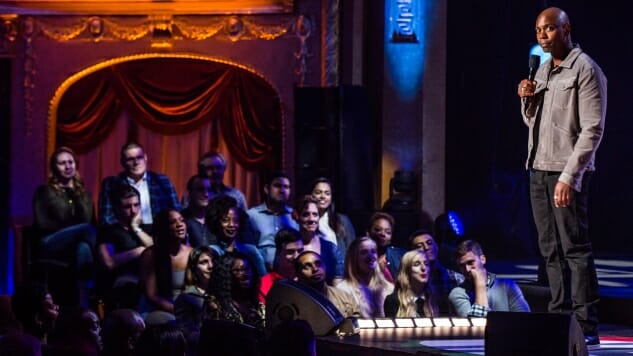Dave Chappelle’s New Specials Try to Pass Off Cruelty as Enlightenment
Photo courtesy of Netflix
At least Dave Chappelle’s new Netflix specials get to the point. The first, Equanimity, is almost a direct response to the controversy surrounding the transphobic content in his last set of Netflix specials, and wastes no time in announcing that audiences have gotten too sensitive. It doesn’t take long for him to start comparing the transgender community to Rachel Dolezal and giving a hearty “yuck” to the idea of Caitlyn Jenner posing nude. He claims that these jokes are just him fucking around, but nothing else he says or does throughout both of these specials suggest that he’s someone who doesn’t want his words to be taken seriously.
Nor is he remotely apologetic for the fallout from last time. “I never feel bad about ANYTHING I say up here,” he says, earning himself an applause break. In recounting the story of a trans fan writing him to tell him how horrible his jokes have made them feel, he shows about two seconds of remorse before selling out the moment by using it as a segue to tell the very joke that hurt them in the first place. He makes a point about how the conversation surrounding trans rights is affected by white privilege before immediately switching gears to admit his grudge might come from accidentally dancing with a trans woman at a party once. “You can’t take these moments out of context!” you might say. They’re bad in context too.
And they’re manipulative. Chappelle feints towards displaying an understanding of the problem—the transparently tactical pauses that telegraph his uncertainty about diving into a controversial topic—are designed to make you, on-the-fence audience member, feel like you’re listening to a rational, cogent argument and should still feel comfortable laughing alongside him. In fact, it’s just a way to service the next misguided bit. “But the only thing that matters about a joke is that it’s funny!” you might say, and you’d be just as correct in saying that the only thing that matters about an explosion in an action movie is that it goes “boom.” There has to be more nuance to it than that.
His second special, The Bird Revelation, has a bunch of other horrible shit to say that doesn’t look better in context. Chappelle suggests that if Harvey Weinstein looked like Brad Pitt his accusers wouldn’t call it rape, that they should have known a late-night meeting meant sex, that Louis C.K.’s punishment was disproportionate to his crime, that Anthony Rapp was assaulted by Kevin Spacey kind of because it’s the kind of thing that a gay fourteen year old would get himself into, that the women who gave up on comedy after their interactions with C.K. had a “brittle spirit” and sound “weak” and aren’t being held accountable for their part in it, and that some of the accusers coming forward just have “buyer’s remorse” and many of them were more willing than they say they were. Seconds afterward, in each instance, he’s insisting that women are right and the whole thing is very serious, as if cutting off your objections before you can even form them. “Not to victim blame,” he says before unleashing a torrent of victim blaming. It doesn’t come across as nuanced and measured and individual—it comes across as pointlessly contrarian and embarrassingly old-fashioned.
-

-

-

-

-

-

-

-

-

-

-

-

-

-

-

-

-

-

-

-

-

-

-

-

-

-

-

-

-

-

-

-

-

-

-

-

-

-

-

-








































